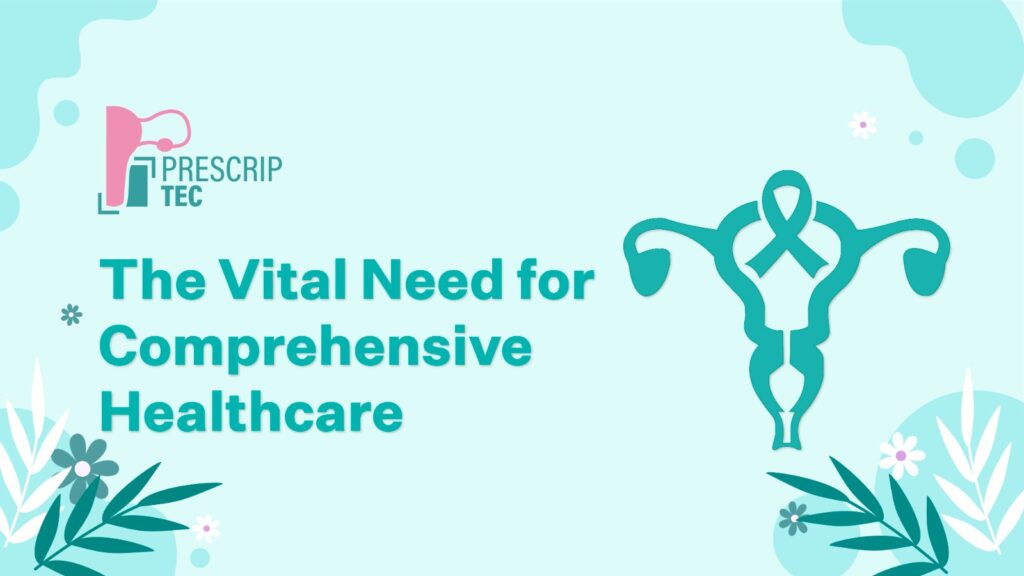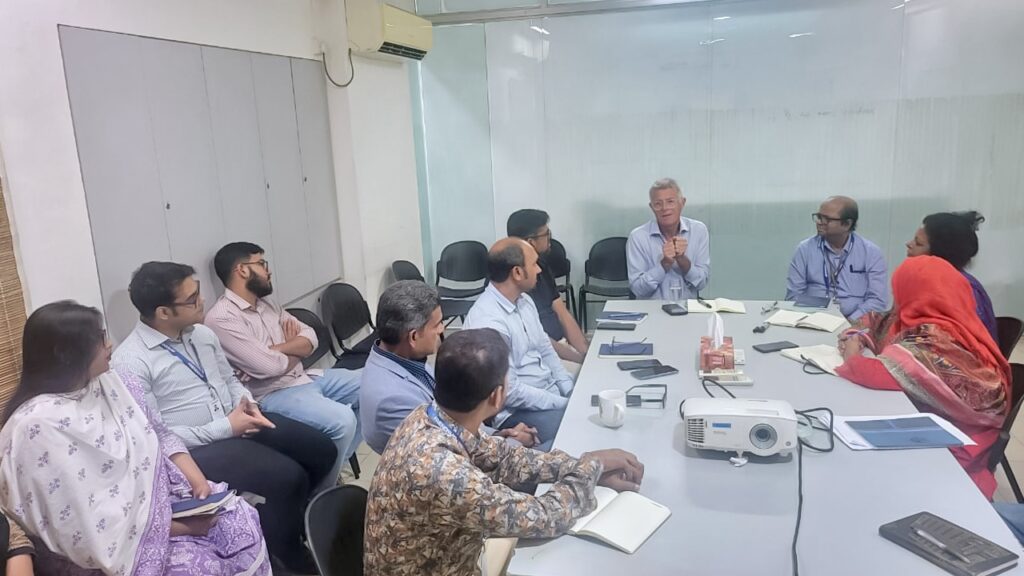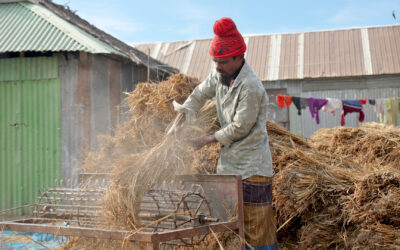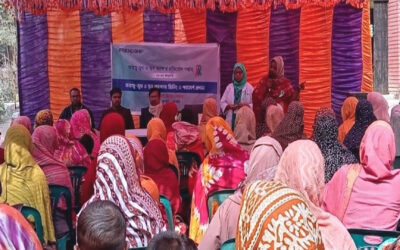OB-GYN Expert, Professor Jelle’s Take on Cervical Cancer Screening

by Iffat Ara Sharmeen,
October 7, 2024
PRESCRIP-TEC researcher and obstetrics and gynaecology expert Professor Jelle Stekelenburg recently visited Friendship’s working areas in northern Bangladesh. He shared his insights and recommendations on the country’s current cervical cancer screening processes.
Professor Jelle currently practises in the Department of Health Sciences, Global Health Unit at the University Medical Centre Groningen, and teaches international reproductive health at the Medical Centre Leeuwarden. He first visited Bangladesh in 1990, when he worked as a medical student at the Gonoshasthaya Kendra. After graduating in 1994, he specialised in tropical medicine, gynaecology, and urogynaecology, mainly working in Africa. He later secured a grant from the European Union (EU) to design a cervical cancer screening strategy, leading to the development of PRESCRIP-TEC and his collaboration with Dr Naheed and Friendship.
95% of the incidents of cervical cancer are caused by persistent and untreated infections of the cervix by the human papillomavirus (HPV). Many of the risk factors of the disease are more prevalent in marginalised communities of developing economies such as Bangladesh, who have too little access to vaccination, screening, and treatment. This means marginalised women in Bangladesh face higher risks of death from cervical cancer. Friendship tried to tackle this gap by providing cervical cancer screening in the chars. Professor Jelle Stekelenburg, a principal investigator in this initiative, visited these communities and provided key recommendations to expand healthcare for women.
WHO developed a global strategy, also known as the 90-70-90, which aims for 90% of girls to be vaccinated by age 15, 70% of women to be screened by age 35, and 90% to receive treatment for precancerous lesions, along with HPV testing for cervical cancer screening. It defines the elimination of cervical cancer as bringing down the incidence of cervical cancer to 4 per 100,000 women by 2120. Implementation has been challenging due to unequal access to healthcare and socioeconomic factors such as poverty. Friendship, an organisation dedicated to underserved communities, collaborated with the International Centre for Diarrhoeal Disease Research Bangladesh (icddr,b) on the Bangladesh segment of the groundbreaking PRESCRIP-TEC project. The PRESCRIP-TEC (Prevention and Screening Innovation Project Towards Elimination of Cervical Cancer) is a global research initiative that has studied cervical cancer screening in hard-to-reach communities in Bangladesh over the past three years.
Professor Jelle commended Friendship for its diligence, work, and the resourcefulness of its medic-aides and mHealth app. He shared some observations and recommendations that could help Bangladesh meet the WHO’s 90-70-90 cervical cancer strategy by 2030 if implemented effectively.

Raising Awareness
Professor Jelle highlighted the lack of awareness about pelvic floor exercises among men and women, emphasizing that women, particularly during pregnancy, should train their pelvic floors to prevent urinary incontinence, uterine prolapse, constipation, vaginal pain, and cervical issues. Friendship medic-aides can teach young women these exercises. A PRESCRIP-TEC study revealed that nearly 50% of women in hard-to-reach areas of Bangladesh and their family decision-makers had low knowledge of cervical cancer risk factors and symptoms, with only 20% aware of the causing virus. Friendship medic-aides can also raise awareness about cervical cancer, its causes, and treatment.
Paying Attention and Expansion
The Alma-Ata Declaration of 1978 identified primary healthcare as key to attaining ‘health for all’, a concept Professor Jelle consistently reiterated during his talk. Developing economies have faced difficulties in implementing the strategy devised in 1978. Thus, Jelle reasoned that it is important to pay attention to preventive programmes such as ORS, screening, vaccinations and building awareness. The attention must be paid according to the local context but also expanded to ensure healthcare coverage for more women. Friendship can advocate for a national-level expansion of cervical cancer screening to the government and relevant stakeholders.
“BSMMU is the focal implementer of the national cervical cancer screening program. Dr. Ashrafunnesa noted that only 5 million women have been covered so far, representing just 8% of women aged 30 to 60, well below the WHO’s recommended 70%. Friendship conducted 8,000 HPV tests, so we need faster action to provide HPV testing at lower costs, as the programme currently relies heavily on VIA,” said Dr Naheed Nazrul, Deputy Director and Quality Advisor, Health and PRESCRIP-TEC Lead at Friendship
Comprehensive Primary Healthcare
Women in hard-to-reach areas struggle to access healthcare and afford HPV tests. Although PRESCRIP-TEC offered user-friendly HPV self-tests, many women avoided testing due to a lack of awareness. Those who tested positive underwent Visual Inspection with Acetic Acid (VIA) for further diagnosis. Jelle highlighted the need for these women to access comprehensive healthcare in one visit, such as preconception, natal, postnatal care, family planning, and integrated cervical cancer and reproductive disease screenings. Friendship can work towards providing tailored healthcare packages for these women instead of focusing solely on selective primary healthcare.
“The basic principle of comprehensive primary healthcare is still applicable and important. We have not talked about it enough in the last decade,” said the professor.
Artificial Intelligence and Genotyping
HPV has many types, with types 16 and 18 being high-risk. Although the prevalence of HPV in Bangladesh is under 5%, genotyping the virulent types in the population can enable targeted healthcare approaches. AI can help alleviate the burden on HPV testing personnel, reduce diagnosis time, and improve diagnostic accuracy, as seen in PRESCRIP-TEC studies. Jelle encouraged Friendship to consult experts and healthcare advocates about using AI and genotyping to enhance treatment and screening quality in cervical cancer screening.
“Many women may have undergone multiple screenings, and in some cases, the recommendation for screening every 5 years was not communicated. We have shared PRESCRIP-TEC with experts and are awaiting their feedback on expanding HPV testing at lower costs,” stated Dr Aminur Rahman, Project Coordinator and Associate Scientist, icddr,b.
Dr Jelle concluded that Friendship should focus on horizontal programmes for addressing comprehensive healthcare models instead of vertical programmes for achieving health for all. In addition, Friendship should be involved in advocacy with WHO and government authorities for disseminating PRESCRIP-TEC research results by collaborating with icddr,b. Attention is also needed for referred women who received inadequate treatment. Last but not least, Friendship could include 164 HPV-positive women’s data with BSMMU for future research.



